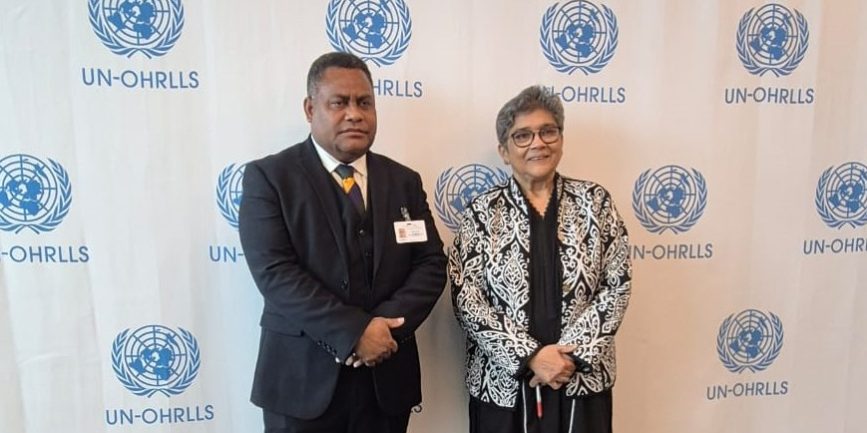The United Nations Office of the High Representative for the Least Developed Countries, Landlocked Developing Countries, and Small Island Developing States (UN OHRLLS) has reaffirmed its commitment to supporting the Solomon Islands’ graduation from Least Developed Country (LDC) status.
This was the emphasis of a key bilateral meeting between the United Nations Under-Secretary-General and High Representative, Ms. Rabab Fatima, and the Minister of National Planning and Development Coordination of the Solomon Islands Rexon Ramofafia on the margins of the UN General Assembly in New York.
In the meeting, Minister Ramofafia emphasized the importance of ensuring that the country’s Smooth Transition Strategy (STS) reflects the unique needs and challenges of the Solomon Islands.
“We do not want a top-down strategy or a copy of another country’s STS. It must be tailored to our specific circumstances,” he said.
Ms. Fatima, who has been a vocal advocate for Small Island Developing States (SIDS), particularly those in the Pacific, echoed the Minister’s concerns.
“I have become the biggest champion for the small island states. The countries in the Pacific face particular challenges, and we are dedicated to providing strong support,” she remarked, reiterating her dedication to supporting the Solomon Islands through its STS.
Discussions focused on the progress of the Solomon Islands’ STS, a crucial component of its LDC graduation. Minister Ramofafia expressed gratitude for the continued assistance from UN OHRLLS, as well as the United Nations Economic and Social Commission for Asia and the Pacific (UN ESCAP) and other development partners. He stressed the need for further assistance in refining the STS to align with the nation’s specific context.
“We are working closely with UN ESCAP and greatly appreciate the funding and support provided,” the Minister noted.
However, he voiced concerns about the collaboration between external consultants and the government, reiterating that the STS must reflect the unique realities of the Solomon Islands.
“It is vital that the strategy is not imposed from the outside but designed to address our specific needs and challenges.”
Ms. Fatima assured the Minister that the consultants would work closely with the Government and a local consultant to ensure the STS is genuinely reflective of the country’s priorities.
“The STS must be by and for the Solomon Islands. I will personally ensure that the consultant is working to reflect your priorities, and we will explore the possibility of engaging a local consultant to bring more local context to the process,” she affirmed.
In addition to the STS, the meeting addressed broader challenges the Solomon Islands faces in preparing for LDC graduation. Minister Ramofafia outlined the government’s ongoing efforts to secure tangible support for key development projects that will drive the country’s post-graduation growth. Ms. Fatima also discussed the potential for utilizing the UN Technology Bank to aid these efforts, pledging to prioritize the Solomon Islands’ needs.
Looking ahead, Ms. Fatima announced a peer learning and exchange meeting on LDC graduation, which will take place early next year.
The event will bring together countries nearing graduation, including the Solomon Islands, to share experiences and strengthen their respective transition plans.
“This will be a valuable opportunity for countries to learn from each other and reinforce their strategies for a smooth transition,” she stated.
The bilateral discussions concluded with a commitment to ongoing collaboration. Ms. Fatima reassured Minister Ramofafia that she would personally address the concerns raised regarding the STS and promised immediate follow-up through the Solomon Islands Permanent Representative to the UN, H.E Ambassador Jane Waetara.
The Solomon Islands’ transition from LDC status remains a high priority for both the government and UN OHRLLS, as both parties work together to ensure sustainable development and resilience for the country.
- MNPDC









